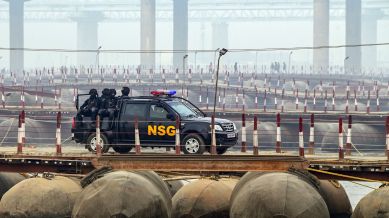Stay updated with the latest - Click here to follow us on Instagram
Maha Kumbh Mela 2025: Kalpwas pilgrims get ration cards for subsidised flour, rice & sugar
During Kalpwas, devotees reside in tents along the Sangam, embracing a simple lifestyle free of modern comforts, to purify their body, mind and soul.

THE STATE government on Friday began issuing ration cards under which flour, rice and sugar will be provided at subsidised rates to those participating in the month-long Kalpwas during the coming Maha Kumbh in Prayagraj.
The Kalpwas period is scheduled to begin on January 13. The government will issue permit cards to akharas and institutions under which they can collect sugar, rice and flour at subsidised rates.
monthly limit of free stories.
with an Express account.
During Kalpwas, devotees reside in tents along the Sangam, embracing a simple lifestyle free of modern comforts, to purify their body, mind and soul.
Under the ration card scheme, each unit will receive three kg of flour and two kg of rice at subsidised rates — flour at Rs 5 per kg and rice at Rs 6 per kg. Additionally, each cardholder will be entitled to 1 kg of sugar for Rs 18, said district supply officer, Kumbh, Sunil Singh.
The government expects that nearly 1.2 lakh ration cards will be issued during the Maha Kumbh. To facilitate this, a team of 93 specially trained lekhpals has been deployed who will issue the cards after completing verification. Applicants are required to submit address verification documents.
These subsidised ration will be distributed through 138 fair price shops, set up across the 25 sectors into which the Maha Kumbh area is divided, said Singh.
To ensure adequate storage, the government has established five large warehouses to stock flour, rice and sugar. From these warehouses, ration will be supplied to fair price shops. The government has prepared to keep a stock of 60,000 quintal flour, 40,000 quintal of rice and 20,000 quintal of sugar in these warehouses.
The construction of these shops is nearly complete, and supplies will soon be dispatched for distribution. The government is establishing 24 gas agencies, where new gas connections will be provided to eligible persons following verification.
Persons already having empty gas cylinders can avail refilling services at these agencies. Special arrangements have been made to cater to three cylinder sizes — 5 kg, 14.2 kg and 19 kg — to accommodate varying needs.
The government plans to issue permit cards to akharas and institutions participating in the Maha Kumbh. These cards will be issued based on requests from akharas and institutions, after thorough verification. Sadhus and members can collect rations directly from the warehouses.
The people undergoing Kalpwas period will begin their day with a holy dip in the river at sunrise, followed by prayers, chanting of mantras, and reading or listening to sacred texts. They consume only one sattvic (pure) meal a day, devotees also engage in collective prayers and rituals with fellow Kalpwasis, guided by the teachings of spiritual leaders present during the Maha Kumbh.
Colour-coded e-passes for vehicles, Mela authority says it’s for safety & convenience
TOensure safety and convenience of devotees attending Maha Kumbh, the Prayagraj Mela Authority is introducing six colour-coded e-passes.
These passes are designed to regulate vehicle movement and ensure effective crowd management during the grand event. The quota for vehicle passes is being determined on the basis of specific categories and nodal officers have been appointed to oversee approvals.
The six e-passes will be issued based on the category of the pass holder. A white-coloured e-pass is designated for High Court vehicles, VIPs, foreign ambassadors, foreign nationals, non-resident Indians and representatives from central and state government departments. The saffron-coloured e-pass has been reserved for Akharas and institutions, while the yellow e-pass will be issued for working agencies, vendors, food courts and milk booths. Mediapersons will be issued sky blue passes, while blue will be designated for the police For emergency and essential services, e-passes will be red in colour.
To ensure a hassle-free experience for devotees, vehicle parking arrangements have been made across all sectors of the Mela area. E-passes will be issued for the vehicles of departmental representatives and working agencies.
The quota for vehicle passes has been determined based on the category of the applicant, and nodal officers have been appointed in each department for the approval process. Once the nodal officer provides a recommendation, vehicle details will be submitted online for
approval.
The government has entrusted UPDESCO, the state’s nodal IT institution, with managing the process. Nodal officers from various departments, fair police and associated institutions will be responsible for verifying vehicle pass applications based on the approved quota.
Applicants must submit personal details and copies of the required documents.
with inputs from ENS